News analysis
With Ukraine repeatedly losing ground to the Russian army in recent months, the U.S. seems to be pressing Communist China for its role in aiding the Kremlin’s war on the former Soviet republic.
The developments come amidst U.S. Secretary of State Antony Blinken’s April 4 declaration that “Ukraine will become a member of NATO” as American and allied support for Kyiv remains “rock solid.”
An article published on April 3 by POLITICO Europe cited senior Ukrainian military officers as saying that their frontlines were in danger of collapse should the Russians choose to mount a serious offensive in any sector, given the military advantages Moscow now enjoys in the two-year war.
Earlier, on Feb. 24, the second-year-anniversary of the start of the war, NATO Secretary General Jens Stoltenberg also claimed that Ukraine’s joining the U.S.-led alliance was “not a question of if, but of when.”
Success
You are now signed up for our newsletter
Success
Check your email to complete sign up
While reiterating support for Ukraine, the Biden administration has also ramped up rhetoric criticizing the People’s Republic of China (PRC) for its partnership with Russia, adding to its condemnation of the Chinese Communist Party’s aggression in the Asian region as well as the regime’s destabilizing economic practices.
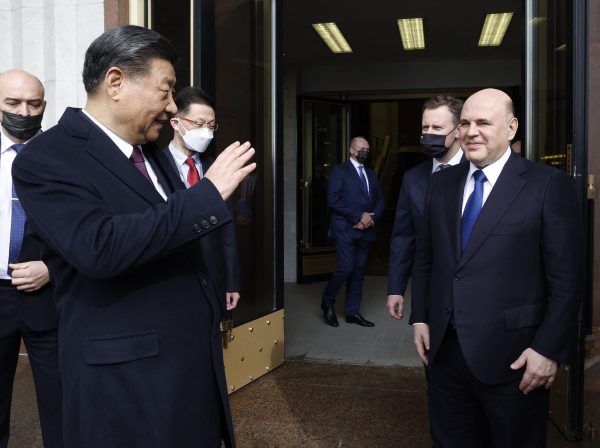
At the same time, Washington has indicated it will step up restrictions on Chinese imports of advanced technology and pursue other measures in cooperation with its allies to disincentivize Beijing from undermining the U.S.-led international order.
READ MORE
- Communist China Heads Down a Road of Isolation and Impoverishment
- Peter Pellegrini Wins Slovak Presidential Election, Beating Pro-Western Opposition
- Controversial Geoengineering Experiment Launched Quietly in San Francisco
As observed in previous months by New York-based political risk consultancy SinoInsider, the U.S. tightening the screws on the PRC over Beijing’s support for Russia was a likely development. In an April 8 newsletter entry, the analysts wrote that the Biden administration could also be responding to “the Xi leadership’s growing authoritarianism and overt geopolitical ambitions, as well as increasing awareness and knowledge of the PRC’s threat to the security of respective nations.”
Washington reprimands China for Russia support
During meetings with EU and NATO ministers in the week of April 1 (Monday), U.S. Secretary of State Antony Blinken highlighted the “concerning scale” of PRC aid to the Russian war effort, including “tools, inputs, and technical expertise,” according to multiple insiders cited by the UK-based Financial Times for an April 5 article.
“The warnings were explicit. There has been a shift and it was felt in the room … this was a new development. It was very striking,” one person familiar with the discussions between Blinken and the EU and NATO ministers told FT.
According to the insiders, Blinken said that People’s Republic of China (PRC) assistance to Russia was heavily weighted towards materials useful for Russian production of optical equipment, propellants — such as for shells and missiles — and space sector products.
Such trade “not only contributes to Russia’s aggression in Ukraine but threatens other countries,” Blinken stressed.
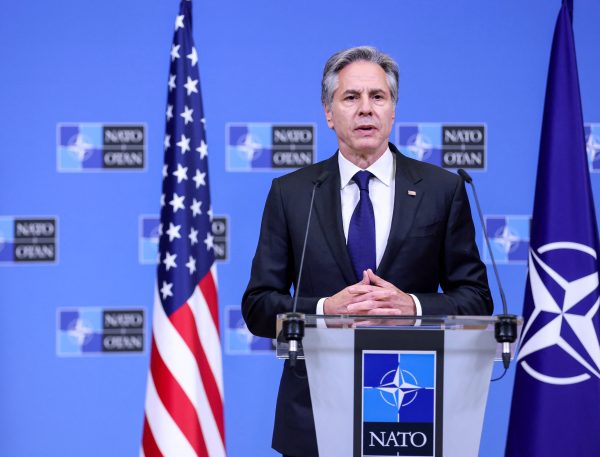
On April 6, Bloomberg reported on how the U.S. is speaking to its allies on the issue of PRC support for Russia, according to people familiar with the situation. Beijing has been providing satellite data to the Russians for military intelligence, as well as selling the Kremlin microelectronics and machine tools for tanks, optics, and other military goods.
According to White House National Security Council spokesperson Adrienne Watson, U.S. President Joe Biden brought up these concerns with Chinese leader Xi Jinping during their latest phone call on April 2, as reported by Bloomberg. In addition to other materials used in the defense industry, Biden also mentioned China’s supplying Russia with nitrocellulose — a key chemical ingredient in explosives — and turbojet engines.
Meeting with Chinese vice premier He Lifeng on April 6 in the southern city of Guangzhou, U.S. Treasury Secretary Janet Yellen said that companies, including Chinese firms, “must not provide material support for Russia’s war against Ukraine, including support to the Russian defense industrial base.”
She added that there would be “significant consequences if they do so.”
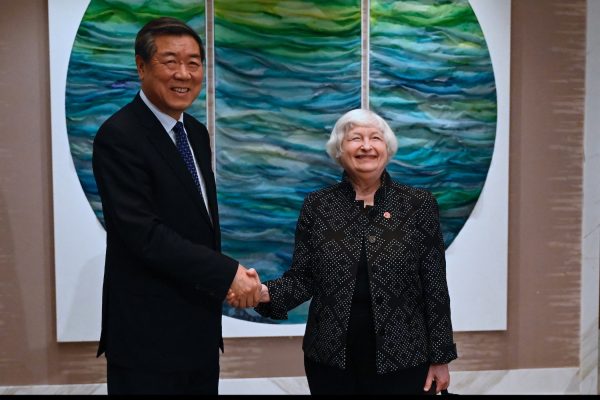
Worsening battlefield fortunes for Ukraine
Russia has been waging a full-scale war against Ukraine since February 2022, a conflict President Vladimir Putin has claimed is necessary to prevent the country from drifting into the Western sphere of influence and bring it back into the Russian fold.
By the end of 2022, the war had devolved into a World War I-like stalemate as the prevalence of drones for surveillance and bombardment, as well as precision munitions made it exceedingly difficult for either side to mount effective offensives under immediate and accurate artillery fire.
The Ukrainian officers speaking with POLITICO, who served under Ukraine’s ousted top general Valery Zaluzhny, based their concern of Russia being able to “penetrate the front line and to crash it in some parts” on the Russian military’s gradual buildup of forces numerically superior to the Ukrainians, as well as the Kremlin’s deadly use of cheap yet massive Soviet-designed aerial bombs upgraded to glide dozens of kilometers and strike battlefield targets with great precision.
- Ukraine Outnumbered, Outgunned in Face of Relentless Russian Onslaught
- Beijing Sees High-level Talks as Tool to ‘Forestall and Delay’ US Pressure, Congressional Report Warns
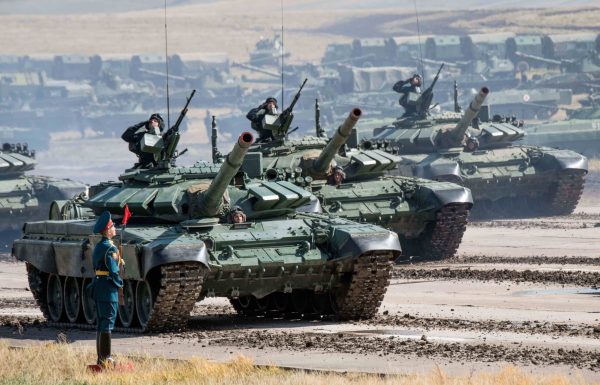
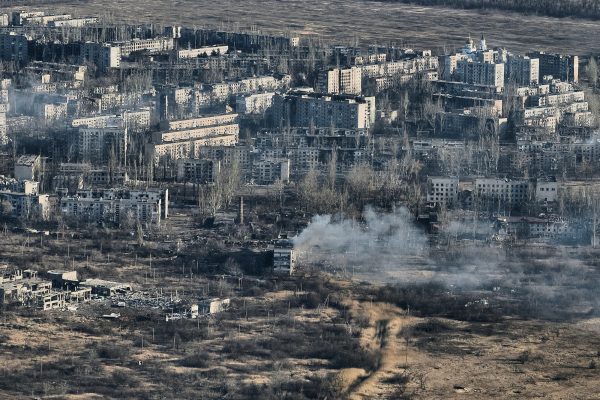
One of the top-ranking military sources said, “There’s nothing that can help Ukraine now because there are no serious technologies able to compensate Ukraine for the large mass of troops Russia is likely to hurl at us. We don’t have those technologies, and the West doesn’t have them as well in sufficient numbers.”
Western aid has helped Ukraine hold out against the invasion, but even this has not been sufficient to compete with the vast Russian warmaking potential. Critically, Moscow outstrips Ukraine and the West in production and acquisition of artillery rounds.
While the Ukrainian army managed in late 2022 to liberate some of its territory lost in the beginning of the war, a highly advertised counteroffensive last summer failed to make a significant dent in the Russian defensive lines.
Since then, the Russian army, already enjoying advantages in artillery and airpower, has made small but continuous advances, while inflicting greater casualties on the Ukrainian forces. In February, the key town of Avdiivka fell, followed up by numerous other local Russian victories. As of early April, Russian troops had secured the hotly contested suburbs of Bakhmut — the city itself had fallen nearly a year ago last May — and were pressing further westwards to Chasiv Yar, considered a gateway to the western Donbass region.

Adding to Chinese trade and its own formidable defense industries, Russian forces have been greatly boosted by millions of shells and rockets from North Korea, which has been developing closer ties to Moscow. In late March, Russia used its U.N. veto power to block the renewal of longstanding sanctions on North Korea for its nuclear weapons and ballistic missile program.
Ukraine applied for NATO membership in September 2022. But while U.S. and NATO officials have said Kyiv is capable of joining, concrete pledges have been lacking, according to an April 4 POLITICO article. Moreover, Ukraine’s membership would put the alliance in a bind, given that its ongoing conflict with Russia and territorial losses would, at least in theory, compel NATO to fight Russian troops head-on — a harrowing prospect given the Kremlin’s massive arsenal of nuclear weapons.
US steps up containment of Communist China
In addition to chastising the PRC over its aid to the Russian war effort, the Biden administration has taken other new steps to undercut Beijing and strengthen the U.S. and allied geopolitical stance against the communist regime.
According to an April 4 Reuters piece citing people familiar with the situation, Washington is working on having the Netherlands stop leading Dutch semiconductor equipment firm ASML from servicing certain Chinese clients. On April 7, Reuters further reported that although “Prime Minister Mark Rutte’s government is reluctant to make a blanket decision, its public statements and national security interests suggest it will be slow to approve Chinese maintenance requests in future and quick to deny them.”
- Soaring Numbers of Chinese Nationals Arrested at US Southern Border as Communist Party Intensifies Oppression
- ‘The CCP is the greatest enemy of the Chinese nation’: Statements From the Tuidang Movement
- Chinese Weapons Industry Booming as Overall Economy in Decline
One of the insiders cited in the earlier article said that Washington could also be seeking to add to a list of Chinese semiconductor factories restricted from receiving Dutch equipment as part of U.S. export policy chief Alan Estevez’s discussions with officials from the Dutch government and ASML Holding NV on April 8.
In their April 2 phone call, President Biden, in addition to raising concerns about Chinese support for Russia’s war effort, also brought up the PRC’s “unfair trade policies and non-market economic practices.”
The U.S. and other Western governments have complained about Chinese dumping of excess industrial and production capacity in overseas markets, something that economists and policymakers say risks impacting the stability of the global economy.
Meanwhile, Xi warned Biden that “the Taiwan question is the first red line that must not be crossed in China-U.S. relations” and “China is not going to sit back and watch” if the U.S. is “adamant on containing China’s hi-tech development and depriving China of its legitimate right to development.”
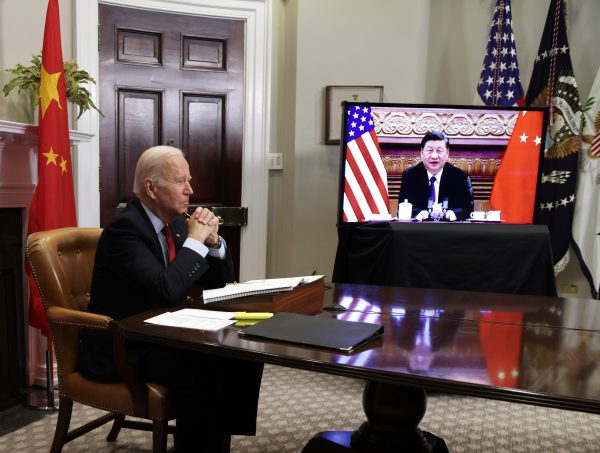
- US Seeks to Revive Dormant Shipyards With Help From South Korea and Japan
- South Korea Forges Tougher Approach to Handle Nuclear-armed North
- Toronto Marks 65th Tibetan Uprising Anniversary With Rally Against the CCP
On security matters, the U.S. has further built up its alliance with friendly countries in the Asian region. On April 3, Deputy Secretary of State Kurt Campbell suggested at a think tank event in Washington D.C. that the AUKUS submarine project between Australia, the United Kingdom, and the United States could help deter a mainland Chinese move against Taiwan.
Taiwan, officially the Republic of China (ROC), is claimed by Beijing as part of the PRC’s territory. The ROC used to govern mainland China before its 1949 defeat there in the civil war with the communists.
Campbell also said that the U.S., Japan, and the Philippines will have an “unprecedented trilateral engagement between the three nations” in the week of April 8. “You will see commitments on all three nations that involve closer coordination and engagement in the South China Sea and elsewhere,” he said at the Center for a New American Security.
On April 10, Biden met with Japanese Prime Minister Fumio Kishida in Washington, D.C., where they announced deeper military, economic, and other forms of cooperation between America and Japan with an eye to countering China.
“This is the most significant upgrade of our alliance since it was first established,” Mr. Biden said at a news conference in the White House Rose Garden that he attended with Kishida.
The Japanese statesman, for his part, stressed his country’s support for Ukraine, and warned that a similar conflict could break out closer to home.
“Ukraine today may be East Asia tomorrow,” he told reporters.















